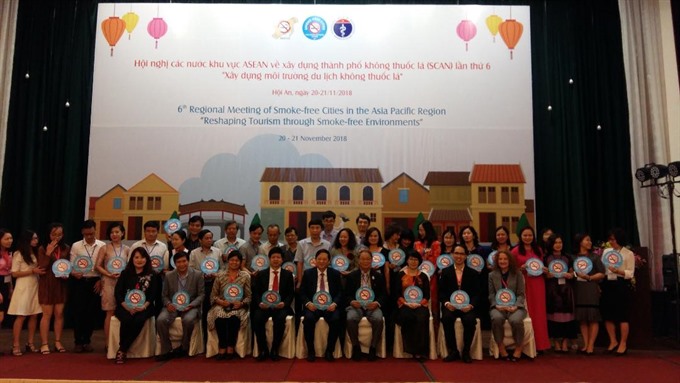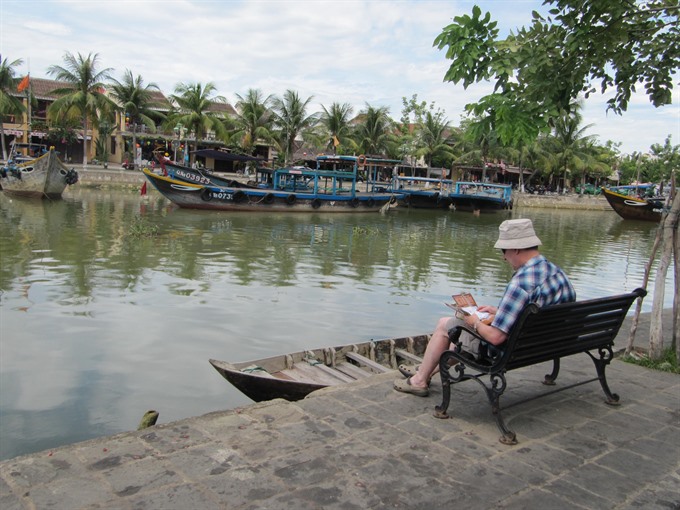 Society
Society

Việt Nam will promote education on tobacco prevention at schools, propose a higher tax rate on cigarettes, raise serious reports on smoking-related diseases and impose strict punishments on violations in smoke-free areas.
 |
| Participants in a photo session at the 6th Regional Meeting of Smoke-free Cities in the Asia-Pacific Region in Hội An. — VNS Photo Công Thành |
HỘI AN — Việt Nam will promote education on tobacco prevention at schools, propose a higher tax rate on cigarettes, raise serious reports on smoking-related diseases and impose strict punishments on violations in smoke-free areas.
Vice director of the medical service administration Nguyễn Trọng Khoa said the initiative was proposed by Việt Nam at the 6th Regional Meeting of Smoke-free Cities in the Asia-Pacific Region in Hội An yesterday.
The meeting, entitled ‘Reshaping tourism through smoke-free environments,’ drew the participation of more than 100 deputies and experts from Thailand, Laos, Cambodia, Indonesia, Myanmar, Malaysia, the Philippines, Mongolia, China and Việt Nam in discussions on how to build a network of smoke-free cities and non-smoking tourism sites.
Khoa said Việt Nam would take stronger actions on smoking violations at public sites and adjust tax policy on tobacco production and trade to reduce smoking in the community.
“Việt Nam was the 47th country among 174 countries ratifying the World Health Organisation (WHO)’s Framework Convention on Tobacco control (WHO FCTC), and the National Assembly of Việt Nam issued laws on tobacco prevention in 2013,” Khoa said.
He said the Vietnamese Government’s actions had achieved good results and changes among the community in raising awareness of the harmful impacts of smoking.
“The number of male smokers has been reduced from 47.2 per cent to 45.3 per cent, while second-hand smoke in restaurants also decreased,” he said.
“The ratio of smokers in universities and public transport vehicles also dropped to16.4 per cent and 15 per cent, respectively,” he said, adding that smoking at workplaces also went down to 13.3 per cent.
Khoa said the ministry of health would submit a request to the government to institute a higher tax on tobacco and punish smoking at public sites.
Dr. Ulysses Dorotheo, executive director of the Southeast Asia Tobacco Control Alliance (SEATCA), said smoking pollutes the environment through discarded cigarette butts, while smoke-free tourism would promote health.
“If you build up a non-smoking environment at restaurants and tourism sites, visitors feel healthy and welcomed,” said Dr. Dorotheo. “At restaurants where no one smokes or throws cigarette butts, food is much more appealing.”
“Smoke-free environments are very helpful to the tourism industry,” he said. “They also protect people’s health and the environment, and maintain a clean atmosphere that encourages visitors to return many times.”
 |
| A tourist enjoys the peace and fresh air of a non-smoking area in Hội An. — VNS Photo Công Thành |
He suggested the government of Việt Nam should divest state funds from tobacco manufacturing plants to reduce tobacco production.
He said the most difficult challenge for Việt Nam in building smoke-free cities is educating more people and raising awareness on tobacco.
“Putting more no-smoking signs at public sites will remind people that smoking is not normal to do and that it is prohibited for a reason, Dr. Dorotheo said. “People should learn that health is very important. I know today is Teachers’ Day in Việt Nam and it is very important to teach young people that smoking is very bad for their health, especially smoking at a young age.”
He emphasised that people should be educated that smoking is not only harmful to their health, but also to people nearby.
He cited the example of the Philippines, where tourists are greeted with big signs saying ‘welcome to a smoke-free city’ at the airports. Alternatively, tourists are played a message in airplanes, saying ‘we are landing in a non-smoking city that does not allow smoking in public.’
Deputy Minister of Health Nguyễn Viết Tiến said the Vietnamese Government had committed to strong controls on tobacco and to reducing the number of smokers.
“We started the implementation of the Law on Tobacco Harm Control and Prevention, especially the expansion of non-smoking communities and the establishment of a Tobacco Harm Prevention Fund,” Tiến said.
He said non-smoking environments have been promoted in different provinces and big cities, and smoking bans were instituted at 1,200 schools nationwide. 51,000 labourers gave up smoking.
He said the meeting aimed to promote a non-smoking tourism environment in region, and share experiences in controlling smoking.
According to WHO, while progress has been made in tobacco control, more efforts are needed on anti-tobacco measures and the reduction of deaths related to smoking in Việt Nam.
The number of smokers is still high, with 45.3 per cent of men smoking cigarettes. As part of a recent survey, 80 per cent of people said they had seen smokers at restaurants and in public.
About 170,000 Vietnamese people died of cardiovascular diseases, stroke and non-communicable diseases, 33 per cent of which were related to smoking, a WHO report showed.
The tax on tobacco in Việt Nam is still low at 35 per cent, in comparison with an average of 56 per cent worldwide. WHO recommends a tax of 70 per cent.
Tobacco kills seven million people each year, according to the WHO. — VNS